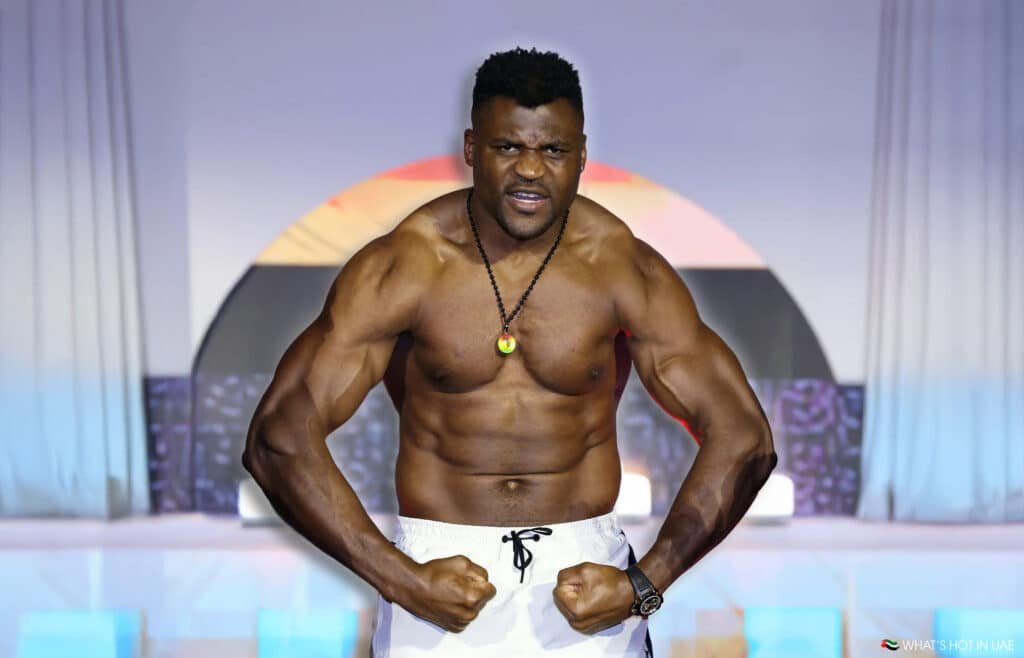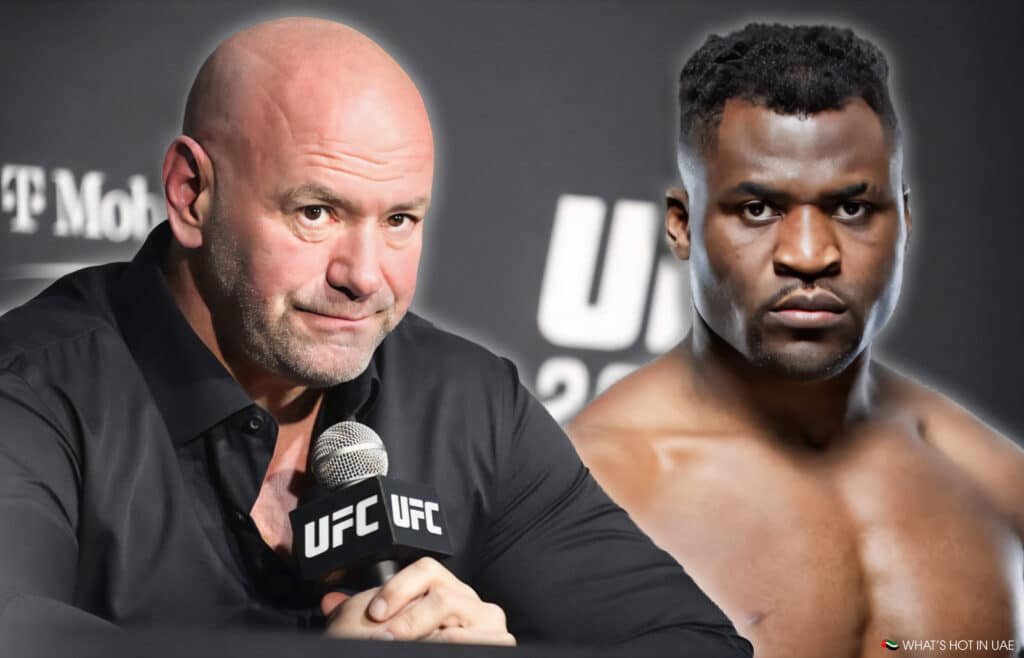The world of mixed martial arts is no stranger to conflict, but the public and acrimonious split between UFC President Dana White vs Francis Ngannou the former Heavyweight Champion has become one of the most significant controversies in the sport’s modern history. The saga reached a new level of intensity following White’s explosive claims on the Flagrant podcast, where he painted a picture of Ngannou as a difficult and entitled athlete. For fans caught in the crossfire of conflicting narratives, understanding the truth has been a frustrating exercise in piecing together soundbites and social media posts. This is the definitive chronicle. Forget the biased takes and fragmented reports; here is the single, comprehensive, and unbiased timeline that connects every key event, claim, and contract detail of the entire Dana White vs. Francis Ngannou saga.
The Timeline of a Champion’s Exit: How the Dana White-Ngannou Beef Unfolded
The dispute between Dana White and Francis Ngannou was not a sudden explosion but a slow burn, escalating over several years. What began as typical contract tensions morphed into a public battle over fighter rights, respect, and the fundamental structure of the UFC’s business model. This timeline provides a roadmap of the key moments that led to the champion’s unprecedented departure.
- Early 2022: The Standoff is Public: Tensions were already high heading into Ngannou’s title defense against Ciryl Gane. In January 2022, Dana White publicly commented on the contract situation, stating it would get “figured out one way or another,” signaling the long-standing nature of the disagreement even then.
- UFC 270 Aftermath: After successfully defending his title against Gane, Ngannou revealed he fought with a torn MCL. In a now-infamous moment, Dana White did not put the belt on Ngannou in the octagon and was absent from the post-fight press conference, fueling speculation of a major rift.
- The Contract Expires: Following the Gane fight, Ngannou fulfilled the last fight on his contract. The “champion’s clause” kept him tied to the UFC for a period, but negotiations remained at a standstill throughout 2022 as he recovered from knee surgery.
- January 2023: The Final Split: The UFC officially announced it had waived its matching rights and released Francis Ngannou, stripping him of the heavyweight title. White held a press conference detailing the UFC’s side of the failed negotiations.
- Ngannou’s Rebuttal: Almost immediately, Ngannou gave extensive interviews to outlets like ESPN and MMA Fighting, providing his detailed reasons for leaving and countering the UFC’s narrative.
- May 2023: The PFL Landmark Deal: Ngannou announced he had signed a multi-fight deal with the Professional Fighters League (PFL), an agreement lauded for its unique and fighter-friendly terms.
- The Flagrant Podcast: In a recent interview, Dana White reignited the public feud with personal anecdotes about Ngannou’s character and behavior during their time working together, adding another layer to the public relations war.

The Contract Standoff: What Each Side Really Wanted
At the heart of the Dana White-Ngannou beef was a fundamental disagreement over the terms of a new contract. While the financial figures were staggering, the core of the conflict centered on principles of freedom, control, and the future of fighter treatment in the UFC.
Ngannou’s Demands: More Than Just Money
For Francis Ngannou, the negotiations were about securing rights he felt every independent contractor deserved. He consistently maintained that his primary sticking points were not financial. His demands, as he detailed in multiple interviews, were about restructuring the power dynamic between the promotion and its athletes.
In a widely-cited interview with ESPN’s Brett Okamoto, Ngannou made his position crystal clear: “In that contract, I’m not free”. This sentiment was the core of his argument. He was unwilling to sign a long-term, restrictive deal that prevented him from pursuing other opportunities, most notably a lucrative boxing match. Beyond his own ambitions, Ngannou also pushed for systemic changes. He requested the inclusion of health insurance for all fighters and the right to have a fighter advocate present at all UFC board meetings to represent athlete interests. These were requests the UFC ultimately rejected, solidifying Ngannou’s belief that the promotion was unwilling to concede any measure of control.
The UFC’s Offer: A Record-Breaking Deal Rejected
From the UFC’s perspective, they had made an unprecedented offer that would have cemented Francis Ngannou’s financial legacy. Dana White publicly stated on numerous occasions that the deal presented to Ngannou would have made him the highest-paid heavyweight in the history of the company. The promotion’s stance was that they had met every reasonable financial demand and were prepared to pay Ngannou a sum that far exceeded what any other heavyweight champion had earned.
The UFC viewed Ngannou’s non-monetary demands—such as the freedom to box and the call for systemic changes like health insurance—as untenable and disruptive to their established business model. In the promotion’s view, they had offered a king’s ransom, and the fighter’s decision to walk away was an irrational choice to turn down generational wealth over unrealistic contract stipulations. This positioned the rejection not as a principled stand, but as a miscalculation by Ngannou and his team.
The Public Relations War: Analyzing the ‘Flagrant’ Podcast Bombshell
With negotiations dead, the conflict moved entirely into the court of public opinion. The most recent and potent salvo came from Dana White during his appearance on Andrew Schulz’s Flagrant podcast, where he shared personal stories designed to frame Ngannou’s character in a negative light.
Dana White’s Allegations: ‘Not a Good Guy’
During the podcast interview, White launched a direct assault on Ngannou’s character, moving beyond contract specifics to personal anecdotes. He alleged that Ngannou developed an uncontrollable ego after becoming champion and was difficult to work with. White recounted a story where Ngannou, despite speaking perfect English in private, would pretend his English was poor in business meetings to be difficult.
Most pointedly, White shared an account of Ngannou’s alleged “forceful nature.” He claimed that during a disagreement, Ngannou physically grabbed him by the shirt one time, and on another, tried to order him to book a private jet. These stories were clearly intended to paint a picture of Ngannou as ungrateful, arrogant, and physically intimidating behind the scenes, directly contradicting the former champion’s public persona.
Ngannou’s Counter-Narrative: A Fight for Principle
In stark contrast to White’s account stands Francis Ngannou’s consistent public narrative. Long before the Flagrant podcast interview, Ngannou had been building his case in the media as a fight for principle, not ego. His counter-narrative is one of a man who escaped poverty in Cameroon and refused to be controlled, even by the most powerful promotion in combat sports.
His statements to the media consistently focused on freedom and respect. “I want to be a free man,” he stated, explaining his decision to leave millions on the table. By framing his departure as a stand for all fighters against restrictive contracts, he positioned himself as a trailblazer willing to sacrifice personal gain for a greater cause. This narrative—one of empowerment and fighting for better conditions—directly counters the “difficult ego” persona alleged by White, creating two completely irreconcilable versions of the same man.
The Aftermath: Ngannou’s Landmark PFL Deal and the Industry Impact
After weathering a year of uncertainty as a free agent, Francis Ngannou’s gamble paid off. He signed a groundbreaking deal with the Professional Fighters League (PFL) that went far beyond a simple fight purse. The contract addressed many of the key principles he had fought for with the UFC.
The PFL deal is reportedly one of the most fighter-friendly contracts in MMA history. It not only grants Ngannou the freedom to pursue boxing but also includes several innovative terms. He received an equity stake in the PFL and was named Chairman of PFL Africa, giving him a significant role in the promotion’s expansion. Perhaps most importantly, his contract includes a clause guaranteeing his opponents a minimum purse of $2 million, a direct move to elevate fighter pay across the board. This deal served as the ultimate validation of his decision, proving that a viable and lucrative alternative to the UFC’s restrictive model existed. The long-term impact on UFC fighter negotiations remains to be seen, but Ngannou’s successful exit has undeniably created a new benchmark for what top-tier fighters can demand.

Conclusion: A Legacy-Defining Standoff
The saga of Dana White versus Francis Ngannou is more than a simple contract dispute; it’s a clash of ideologies. On one side was the UFC, a promotional juggernaut built on a model of ultimate control, offering life-changing money in exchange for that control. On the other was a champion who valued freedom and principle above all else, willing to bet on himself against incredible odds.
From the tense contract negotiations to the conflicting public narratives culminating in the Flagrant podcast bombshell, and finally to the landmark PFL deal, the story is one of risk, conviction, and power. This chronicle has pieced together the claims and counter-claims, the demands and the deals, to provide the most complete and unbiased account available. The ultimate victor in this conflict will be debated by fans for years to come, but one thing is certain: Francis Ngannou’s departure has forever changed the landscape of combat sports.
What are your thoughts on the Dana White vs. Francis Ngannou saga? Who do you think will benefit most from this split in the long run? Share your opinion in the comments below.
This article is an analysis of publicly available information, interviews, and reports. The views and statements recounted are those of the individuals involved and do not necessarily reflect the opinions of this publication.
Sources
- Schulz, A. (Host). (N.D.). Flagrant [Audio podcast]. The specific episode featuring Dana White’s comments on Francis Ngannou.
- Okamoto, B. (2023, January 17). Francis Ngannou on UFC exit: ‘In that contract, I’m not free’. ESPN. Retrieved from https://www.espn.com/mma/story/_/id/35468383/francis-ngannou-ufc-exit-contract-not-free
- MMA Fighting Newswire. (2023, January 17). Francis Ngannou explains why he passed on UFC deal for free agency: ‘In that contract, I’m not free’. MMA Fighting. Retrieved from https://www.mmafighting.com/2023/1/17/23559496/francis-ngannou-explains-why-he-passed-on-ufc-deal-for-free-agency-in-that-contract-im-not-free
- Bleacher Report. (2022, January 20). Dana White: Francis Ngannou’s UFC Contract Will Get Figured Out ‘1 Way or Another’. Bleacher Report. Retrieved from https://bleacherreport.com/articles/10024628-dana-white-francis-ngannous-ufc-contract-will-get-figured-out-1-way-or-another



